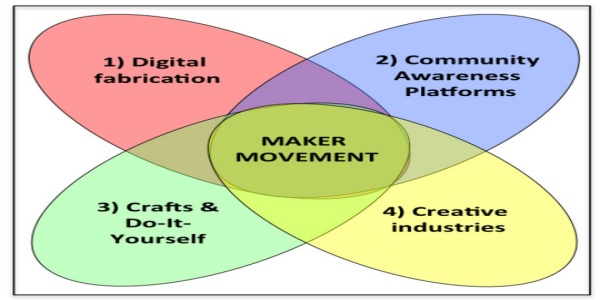What makerspaces REALLY (should) make
Spoiler: it’s not objects.
Three years ago, while I was working on similar research within the DiDIY Project, Adrian Smith published a paper about Social Innovation, Democracy and Makerspaces which, as I see it, attempts to answer at least three evergreen, crucial questions of our times. Questions that every parent and teacher should know. This post is my own synthesis of those answers.

Once again: WHAT is innovation? And which innovation is most urgent?
Generally speaking, innovation is the capacity of people to exploit a new idea or method successfully. Participation, openness and community are not characteristics typically associated with innovation. Historically, innovators have rarely included citizens directly, and too often just to persuade people to buy stuff.
Social innovation, that is innovation directly aiming to improve human welfare, can rely on technologies and other artefacts, such as ICTs for coordination, and indeed lead to novel adaptations and developments in technology. But innovation as conventionally conceived is ill-equipped for social development.
Social innovation is more complicated and challenging than “simply” redirecting conventional innovation capabilities to social goals. Social innovation implies reinventing innovation itself. Because the initial design, development and control of technologies can be key in determining patterns of social development. A textbook example of this is the car, that became a focus for reproducing political and economic privileges.
What do makerspaces REALLY make, and how?
First, participants can themselves make new technologies from the tools available, as evident in various open hardware networks. Second, being digital those tools enable global collaboration.
Third, and this is where things becomes complicated: makerspaces can do nothing more than reproduce dominant values and visions in society. Or, when trying to do things differently, makerspaces can produce knowledge critical towards the dominant ways in which things are designed and made in society.
Makerspaces, that is, equip people to raise profound questions about culture and political economy, and to develop or use intriguing alternatives, that are also much more diverse than before.
In other words, the real innovation that could and should happen in all makerspaces is how they can transform the individuals (or communities) who use them: “New relationships are forged between people and between people and things, as participants connect and prototype in new ways…From an innovation democracy viewpoint, makerspace value comes precisely from this capacity."
Some reality check, shall we?
Sensitive promotion and support of makerspace by public administrations can be very effective. An often quoted example is FabLab Belfast, that was deliberately supported to bridge community divides. So far, however, such cases are exceptions more than rules:
- Makerspaces are pulled in many different directions, mainly because they are of increasing interest to institutions and businesses
- Social privileges and structures, as well as power pressures, do not disappear at the doors of makerspaces
In general, it is hard to strike the right balance of power between bottom-up initiatives that directly or indirectly push institutions to change, and existing institutions, or corporations, influencing the same activities, that is pushing, willing or not, their own agendas and bottom lines.
Makerspaces alone will not overturn dominant political economies of production and consumption. The notion that makerspaces prefigure a substitution for global manufacturing is fanciful. Institutions are important here because they can mobilise resources on the scale needed for connecting makerspaces to more widespread activity. In all these cases, what matters is if, and under which conditions makerspace participants can really challenge, and even reshape, the agendas of sponsors and partners.
Image source: another interesting study of the Maker Movement, “Is the Maker Movement Contributing to Sustainability?"
Who writes this, why, and how to help
I am Marco Fioretti, tech writer and aspiring polymath doing human-digital research and popularization.
I do it because YOUR civil rights and the quality of YOUR life depend every year more on how software is used AROUND you.
To this end, I have already shared more than a million words on this blog, without any paywall or user tracking, and am sharing the next million through a newsletter, also without any paywall.
The more direct support I get, the more I can continue to inform for free parents, teachers, decision makers, and everybody else who should know more stuff like this. You can support me with paid subscriptions to my newsletter, donations via PayPal (mfioretti@nexaima.net) or LiberaPay, or in any of the other ways listed here.THANKS for your support!